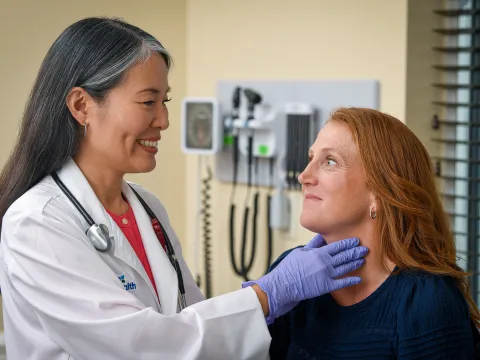- AdventHealth

Choose the health content that’s right for you, and get it delivered right in your inbox.
Preventing something from happening is often easier and more effective than dealing with the consequences after it occurs. Founding Father Benjamin Franklin left us with many practical idioms that still apply to today’s modern life. Perhaps none is more appropriate when it comes to our well-being than “An ounce of prevention is better than a pound of cure.”
Many diseases and health conditions are preventable through measures like choosing vaccination, preventive health screenings and lifestyle choices like avoiding tobacco and prioritizing nutrition.
Your AdventHealth Primary Care+ provider is your first stop for preventive health care. They’ll be your guide on your journey to feeling whole.
Visiting your primary care provider (PCP) yearly for a physical exam allows them to monitor your overall health and conduct preventive health screenings to detect potential issues before they become bigger or lead to complications.
Several types of preventive health screenings address different diseases or bodily systems. Your PCP will suggest tests and screenings based on your age, gender, medical history and personal risk factors, like your lifestyle and family history.
General Health Screenings
Certain health screenings are part of an annual checkup and apply to most adults.
These general health screenings include the following tests:
- Blood pressure: Detects high blood pressure, known as hypertension, which is used to evaluate your risk of heart disease
- Cholesterol (lipid panel): Measures the amount of cholesterol in your blood, which can build up inside the arteries and heighten your heart disease risk
- Blood Sugar (glucose and A1C): Helps detect prediabetes and Type 2 diabetes by calculating the amount of sugar, or glucose, in your blood
- Body Mass Index (BMI) and obesity:– Your BMI is calculated based on your height and weight, and can help your doctor determine your ideal healthy weight and if you are at risk for weight-related health problems
Cancer Screenings
According to the Centers for Disease Control and Prevention, 30 to 50% of cancers could be prevented if people got recommended screenings. In fact, recent studies show that only 14% of diagnosed cancer cases in the U.S. are found because of a screening test.
Cancer screenings are critical for early detection, improving treatment and outcomes.
- Breast cancer screening: Recommended for women ages 40 and over, and includes a mammogram or a mammogram and breast magnetic resonance imaging (MRI) for high-risk patients
- Cervical cancer screening: For women ages 21 and older, this screening includes a Pap smear and testing for the human papillomavirus (HPV)
- Colorectal cancer screening: Starting at age 45, both men and women should be screened for colorectal cancer using either a stool-based testing kit or a colonoscopy
- Lung cancer screening: Current or former smokers between the ages of 50 and 80 should receive a lung cancer screening using a low-dose computed tomography (CT) scan
- Prostate cancer screening: A prostate-specific antigen (PSA) test and digital rectal exam are recommended for men 50 and older to screen for prostate cancer
- Skin cancer screening: A dermatologist can examine and check moles to screen anyone at any age for skin cancer and other skin issues
Infectious Disease Screenings
Because infectious diseases spread easily, being screened is important for your health, the health of your family and the health of your community.
- Sexually transmitted infection (STI) testing: These blood and urine tests check for diseases such as chlamydia, gonorrhea and syphilis, as well as human immunodeficiency virus (HIV)
- Tuberculosis (TB) screening: Skin and blood tests are used to check for the existence of the bacteria Mycobacterium tuberculosis that causes TB
- Hepatitis B and C screening: Adults 18 and over should be screened at least once for the viruses that cause Hepatitis B and C
Bone and Joint Health Screenings
As we age, our bones and joints lose bone mass, making them more brittle, and we have less cartilage and flexibility in the joints. Bone and joint health screenings help your PCP keep an eye on what is happening before major issues occur.
- Osteoporosis screening: Women ages 65 and older and men ages 70 and older should be screened for this bone disease, which can lead to fractures, through a bone mineral density (BMD) test called a dual-energy X-ray absorptiometry (DEXA) scan.
- Arthritis and joint health assessments: Your doctor can screen for arthritis and other joint issues using a combination of physical exams, digital imaging, and laboratory tests.
Vision and Hearing Screenings
Just like our bones and joints, our eyes and ears need to be screened as we age. Annual eye exams look for conditions that could lead to vision loss, and hearing checks can detect age-related hearing loss.
- Eye exams: Vision screenings can lead to the diagnosis of potentially blinding eye diseases like glaucoma, age-related macular degeneration, cataracts and diabetic retinopathy, as well as detect correctable vision problems in children and adults
- Hearing tests: Known as audiometry, hearing screenings are used to assess the hearing capabilities of babies, children and older adults, leading to proper treatments and devices like hearing aids as soon as possible
Mental Health and Cognitive Screenings
At AdventHealth, we care for your whole person, including your mind and spirit. It’s important not to overlook mental health screenings. Getting help improves your outcomes and helps you feel whole.
Your PCP can offer you an initial screening to look for depression and anxiety. These screenings include short questionnaires that allow your provider to evaluate your current mental health and whether or not you need a referral to a specialist.
Your PCP can also provide initial screenings through memory, thinking and problem-solving testing to look for cognitive decline and dementia. Since there is currently no cure for Alzheimer's disease or other types of dementia, early detection is extremely important for early interventions.
Reproductive and Sexual Health Screenings
Certain reproductive and sexual health screenings are important for different life stages and health needs.
These include the following:
- Pregnancy and prenatal screenings can check the welfare of both you and your unborn baby, and may include ultrasounds, blood tests and genetic testing
- Women between the ages of 45 and 55 should get a blood test to check hormone levels to help identify any potential health issues as they move through perimenopause
- Testosterone deficiency screenings are for men over the age of 40 or for men at any age who show symptoms of low levels of testosterone
How to Schedule and Prepare for Health Screenings
Your PCP will suggest specific preventive health screenings based on your gender, age, current health status and family medical history.
If they can’t perform the screening in their office, they’ll refer you to an in-network specialist. As some screenings require a bit of preparation, clinicians will provide you with all the instructions you need before your screening appointment.
Remember that your annual wellness exam is also the best time to speak with your PCP about any preventive health care measures they haven’t discussed with you yet.
Preventive Health Screening FAQs
- Why are preventive screenings important?
-
The earlier disease is detected, the earlier treatment can begin, leading to a better health outcome. Preventive screenings save lives and can also save money by reducing treatment or medication expenses.
- At what age should I start getting health screenings?
-
Most health screenings have different age qualifications. For example, you should start having general health, vision, mental health and reproductive and sexual health screenings at age 18.
Other tests, such as cancer, bone, and hearing screenings, will become necessary as you age. Your AdventHealth Primary Care+ PCP will inform you of what screenings you should have at certain ages.
- How often should I get preventive screenings?
-
This depends on the type of screening, your age and current health. For example, most people need a colonoscopy every 10 years after age 45 unless polyps were discovered in a previous test, or they have a family history of colon cancer. In those cases, your doctor may want you to have more frequent colonoscopies.
- Which health screenings are most important for adults?
-
All of them! Depending on your gender and age, you may need specialized preventive health screenings. Your PCP can answer any questions about which health screenings you need.
- What types of health screenings do women need?
-
All adults need general health, vision, mental health, skin cancer and cognitive health screenings. As they age, women should also receive mammograms, colonoscopies, Pap smears, HPV testing and bone density testing. Learn more about our well-woman exams at AdventHealth Primary Care+.
- What preventive screenings do men need?
-
In addition to general health, vision, mental health, skin cancer and cognitive health screenings, men also need to be screened for cancers like colorectal and prostate, as well as testosterone screening as required.
- Based on my family history, how do I know which types of health screenings I need?
-
Your PCP can help you determine which health screenings you need by talking to you about your family's medical history, both on your father's and mother's side. This can help give your PCP a good idea of your risk factors for certain chronic diseases.
- Does insurance cover preventive health screenings?
-
Most health insurance plans cover many preventive screenings or require minimal co-pays. Having an in-network AdventHealth Primary Care+ PCP can also help you cut costs on any health screenings and tests. Check out the insurance providers we accept at AdventHealth Primary Care+.
- Do I need a doctor's referral for a health screening?
-
Not always. Whether you need a referral depends on the type of screening, your health plan and if the specialist is in-network. Your PCP can help you get any referral you may need.
- Where can I get preventive health screenings?
-
The best place to get a preventive screening is with your primary care provider.
Understanding the Importance of Preventive Health
Preventive health screenings give you the power to take charge of your health. Instead of dealing with a health issue when it happens, screenings detect any possible problems for the best possible outcome.
Your annual health checkup is the best time to talk about preventive care. And when you receive a referral to a specialist within the AdventHealth network of care, it’s even easier to coordinate care and share information between offices.
If it's time for your annual exam,contact your nearest AdventHealth Primary Care+ location to take charge of your preventive health and schedule an appointment today.




